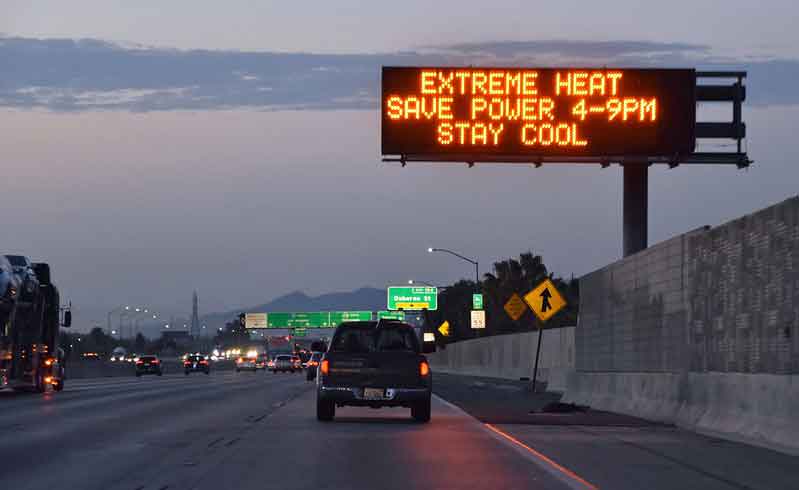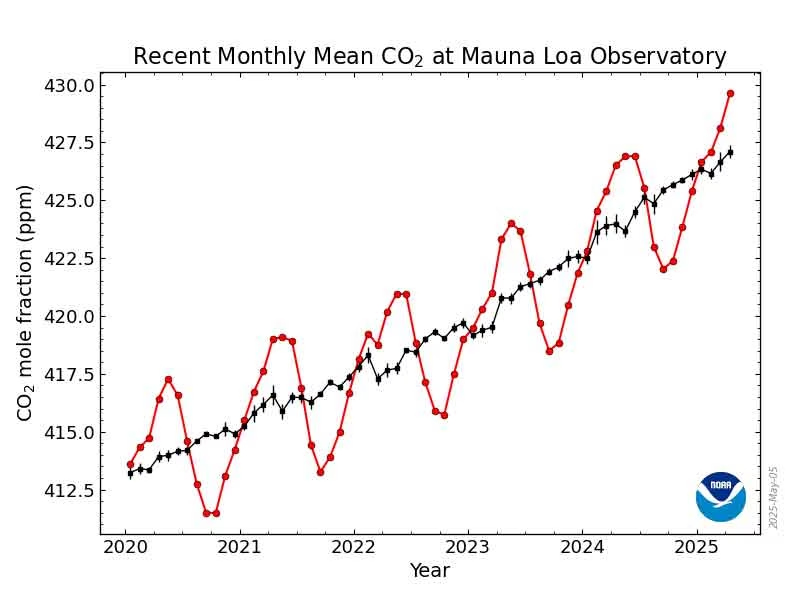
I’ve been writing about climate change for so many years now but, in truth, it was always something I read about and took in globally. It was happening out there, often in horrific ways, but not what I felt I was living through myself. (It’s true that, in past winters, Manhattan’s Central Park went 653 days without producing an inch of snow, almost double any previous record, but if you’re not a kid with a sled in the closet, that’s the sort of thing you don’t really feel.)
However, that’s begun to change. As it happens, like so many other New Yorkers, I only recently experienced a June heat dome over my city. Here in Manhattan, where I walk many miles daily for exercise, it was simply brutal. The sort of thing you might expect in a truly bad week in August.
This June, though, it was hot nationally almost beyond imagining. As I began this piece, it was estimated that more than 270 million Americans, 80% of us, were experiencing a heatwave of a potentially unprecedented sort extending over significant parts of the country. There were devastating early wildfires in the Southwest and West (not to speak of the ones burning long-term in Canada). Ruidoso, a small mountain town in New Mexico that my wife, who grew up in El Paso, Texas, once loved, had at least 1,400 of its structures damaged or destroyed by fire and two people killed.
Meanwhile, as I began writing this, the first tropical storm of this overheated season was already forming in the Gulf of Mexico and heading for Texas, not to speak of those record rainstorms that only recently flooded the Ft. Lauderdale and Miami areas in a distinctly unsettling fashion. And then, of course, there was the National Oceanic and Atmospheric Administration’s prediction that, given how hot the tropical waters of the Atlantic Ocean had become, this year’s hurricane season could prove to be an all-too-literal hell on Earth. There might possibly be 25 named storms (itself a record prediction). And I was thinking about all of this as I sat at my desk in New York City, stripped to my undershirt in the rising heat of a June day from hell.
Honestly, it’s not that complicated. In fact, we should give ourselves credit. We humans have certainly proved to be remarkable — or at least remarkably destructive. Yes, we’ve long been that way, but the levels of that destructiveness have, in recent history, grown in a striking fashion. If you feel in a negative enough mood, humanity’s time on this planet can be seen as a history of ever more horrific wars that, in the last century, became global. And, of course, the second of those world wars ended in an historically unprecedented fashion with the destruction of the Japanese cities of Hiroshima and Nagasaki by a new weapon, the atom bomb, that all too soon proved capable not just of devastating urban areas but of possibly wiping out civilization itself. And that, in a sense, couldn’t be more deeply us. (There are, of course, other histories that could also be written that would be far more encouraging, including a history of literature and of healing, but at least for now let’s leave them aside.)
I mean, give us full credit. In these decades, we’ve discovered — once by the deepest sort of planning and experimentation (think “Trinity,” the code name for the first nuclear test in the desert of Los Alamos, New Mexico, that Robert J. Oppenheimer became so famous for) and then by the inadvertent, if deeply profitable use of fossil fuels — two ways of potentially destroying Earth, at least as a livable place for you-know-who. I’m talking, of course, about the very planet that nurtured humanity for endless millennia.
Nuclear war between great (or even lesser) powers could, of course, quickly produce an apocalyptic scenario that might kill millions of human beings and create a nuclear winter on planet Earth capable of starving most of the rest of us. Climate change, while potentially no less destructive, offers us that apocalypse in slow motion. And that’s obviously why it’s taken me so long, despite all that I’ve written on the subject, to truly feel it myself in broiling Manhattan.
Death by Heat
Oh, and as I sat there sweating profusely in front of my computer on that overheated day, I was struck by a little cheery news when it comes to doing in the planet. As the Guardian recently reported, nuclear spending actually rose globally by 13% in 2023. How farsighted of us!
Congratulations are certainly in order, don’t you think? And to give credit where it’s due, among the nine nuclear powers on this planet, my own country leads the list in increased spending, pouring more billions of dollars into such weaponry than the next eight nuclear powers combined. And mind you, at this very second, two of the planet’s nine nuclear powers, Russia and Israel, are actually at war. While one, Israel, doesn’t mention its nuclear arsenal, the other has repeatedly threatened to use “tactical” nuclear weapons (some more powerful than the ones that destroyed Hiroshima and Nagasaki) in Ukraine or even assumedly elsewhere in Europe.
A third nuclear power, North Korea, has been implicitly threatening to atomize its southern neighbor and foe. Oh, and just for a little even cheerier news, Russian President Vladimir Putin now needs North Korean weaponry so badly to fight his war in Ukraine that he may be willing to aid Kim Jong-un’s scientists in designing “a warhead that could survive re-entry into the atmosphere and threaten its many adversaries, starting with the United States.” So, at the moment, if anything, the possibilities of future nuclear war seem to be on the rise.
Meanwhile, in this planet’s slow-motion version of Armageddon, while we Americans have been experiencing our own extreme weather events from coast to coast, so have other countries, sometimes in an even more devastating fashion. Take Greece, part of a Europe that experienced extreme heat last summer. Only recently, it’s had an early heatwave that scientists say could “go down in history” (at least until next year!) in which at least five tourists have died. And that, in truth, was nothing, not if you shift your focus to Saudi Arabia. There, during this year’s Hajj religious pilgrimage in which 1.8 million well-robed visitors took part, more than 1,300 pilgrims died of heat exposure as the temperature hit 125 degrees Fahrenheit. Meanwhile, South Asia has been broiling, with temperatures there all too literally going sky high — up to 127 degrees Fahrenheit in India and Pakistan — and resulting in increasing numbers of deaths. In India, only perhaps 12% of the population even has air conditioning (which, in any case, simply puts more fossil fuels into the atmosphere). Scores of people have died there from extreme temperatures, including dozens of poll workers during India’s recent election.
Such extremes are becoming a global phenomenon, as is ever wilder weather. Take, for instance, recent record temperatures and a grim drought across significant parts of northern China along with record flooding in the southern part of that country. And mind you, China has done more than any other nation to switch to non-fossil-fuel-producing renewable forms of energy and yet, in 2023, it was also continuing to build new coal-powered plants at a rate of two per week.
Whether cheaper solar and wind energy, which are indeed growing faster than any energy source ever, will leave oil, coal, and natural gas in a historic ditch remains to be seen. In the meantime, our planet is a growing climate mess, with (let’s not forget) us humans continuing to make war on each other in Ukraine and Gaza, efforts that only pour yet more fossil fuels into the atmosphere.
A Slow-Motion Conflagration
This is just the start of a process of climate devastation that, barring surprises, is scheduled to grow ever more severe in the years to come. And if you want to look for a moment at causation (as with nuclear spending), rather than the death-dealing results of it all, consider my country. It’s still setting startling records when it comes to the production of fossil fuels. In fact, in 2023, for the sixth year in a row, the United States set a global record for oil production (an average of 12.9 million barrels a day) and it’s also now the largest exporter of natural gas on the planet.
Meanwhile, the major fossil-fuel companies and their CEOs continue to make absolute fortunes. As the CEO of Chevron put it last year: “In 2023, we returned more cash to shareholders and produced more oil and natural gas than any year in the company’s history.” Hooray! And think of all of that as possibly the ultimate form of warfare on planet Earth. Consider it, in fact, a slo-mo version of atomic war, even if no one normally talks about fossil-fuelized war or anything of the sort.
Those mind-boggling American records took place under a president who has at least attempted to curb climate change. And yet, keep in mind that my fellow citizens, sweating across the country right now, could elect a man in 2024 who has sworn to wipe out our modest steps towards a greener future on the very first day he gets back into the Oval Office (and essentially ignored a question about climate change during the debate Thursday without being seriously challenged for doing so). He’s proudly met with just about every fossil fuel CEO in sight, promising to “end a freeze on permits for new liquefied natural gas,” reverse any steps President Biden took to limit fossil-fuel usage, and is even more proudly ready, as he’s bragged more than once, to “drill, baby, drill” from his first day in office. Meanwhile, of course, many of the countries of Europe, which until now have moved more decisively against the use of fossil fuels, just elected all too many far-right representatives to the European Parliament and may do the same thing in state-by-state elections, and so, as in this country, could reverse course on climate change.
Imagine this then: next June, if I’m still writing TomDispatch pieces, it may be without even that undershirt on. (Excuse me for a moment, while I wipe the sweat from my face.)
The future, as they say, is now and, believe me, I feel it. Right now! (And I don’t often use exclamation points.) And yet, in the slow-motion apocalypse that climate change represents, the one that’s already starting to slaughter human beings before it even truly hits its stride, this is clearly just the beginning, perhaps — though we don’t yet know — just the beginning of the beginning.
Subscribe to Our Newsletter
Get the latest CounterCurrents updates delivered straight to your inbox.
It saddens me beyond words to imagine the future world my grandchildren might find themselves in. It’s true that we should never underestimate ourselves — and not just when it comes to destruction. The switch to non-fossil-fuel forms of energy is distinctly on the rise and they are indeed becoming ever less expensive to install and use. And you never know — you truly don’t — what else the human brain can come up with. Nor, of course, do we know whether, in the grimmest fashion imaginable, we could end all this slow-motion suffering on planet Earth in a nuclear conflagration.
Given our history, who knows what we could do? And I haven’t even mentioned artificial intelligence, have I? I fear I may simply be too old to take all of this in or the ways in which we humans could still prove destructive beyond compare.
Tom Engelhardt created and runs the website TomDispatch.com. He is also a co-founder of the American Empire Project and the author of a highly praised history of American triumphalism in the Cold War, The End of Victory Culture. A fellow of the Type Media Center, his sixth book is A Nation Unmade by War.
Originally published by TomDispatch.com
Copyright 2024 Tom Engelhardt















































